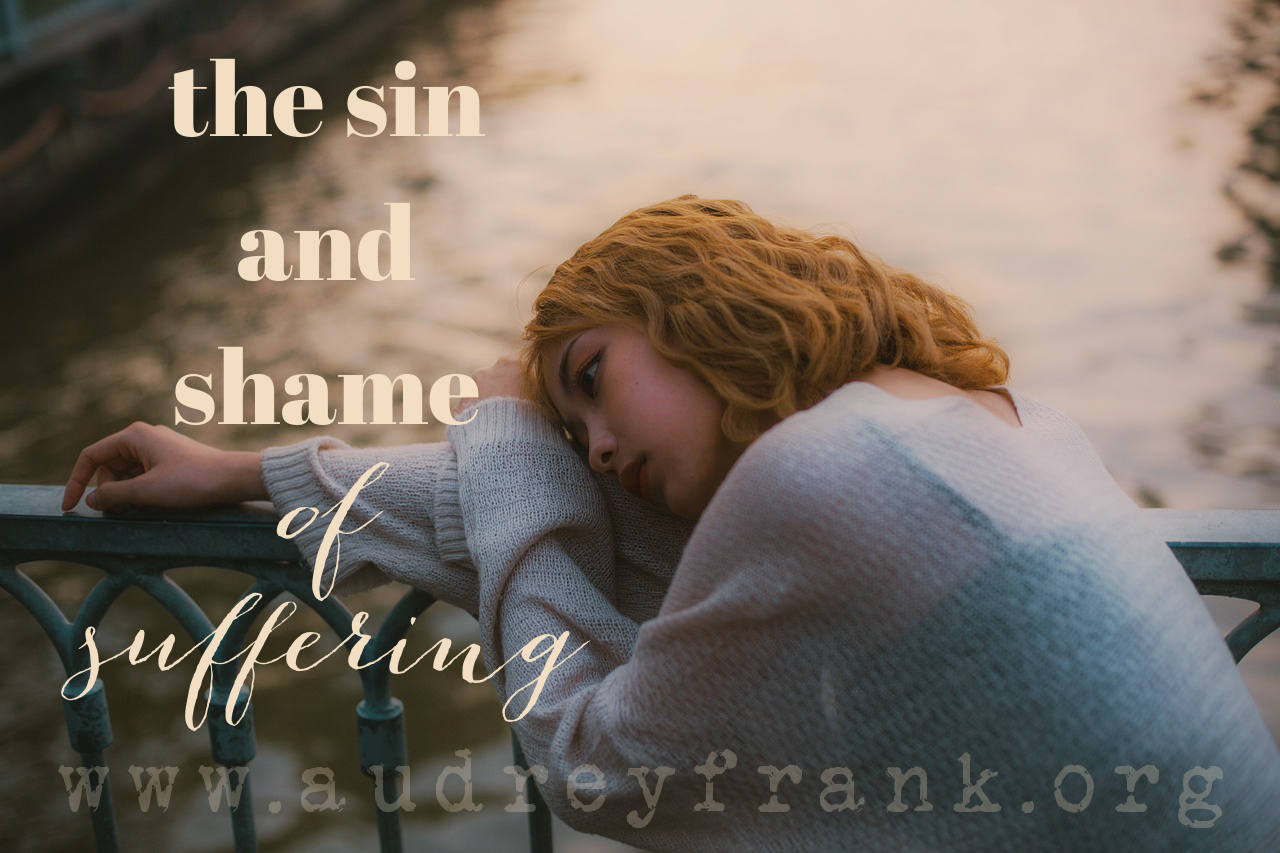The Sin and Shame of Suffering

As he went along, he saw a man blind from birth. His disciples asked him, “Rabbi, who sinned, this man or his parents, that he was born blind?” “Neither this man nor his parents sinned,” said Jesus, “but this happened so that the works of God might be displayed in him. John 9:1-3
His espresso eyes welled with sincerity as he sat gingerly on my bed.
What sin have you committed, sister? I have come to ask God to forgive you and heal you.
My migraines were exponential in the equatorial heat, and carrying water on my head in five-gallon buckets was not helping.
I was spending more and more time in the welcoming relief of my shadowy mud house, retreating from sun and exertion.
A tribal pastor from a neighboring village, the maker of my drums, had heard of my malady and made the journey to visit today. He knew the root of my problem. Or so he supposed.
In his culture, sick people should never suffer alone. It was not uncommon for more than twenty children and adults to gather in my small room and watch me with baleful, worried eyes.
But no one sat with me anymore. I couldn’t bear it. I couldn’t tolerate the sunlight, the conversation, or the heat. I wondered if my friends ever experienced migraines, or if it was a peculiarly Western disease.
All I wanted was to be alone, in the dark, in the quiet.
In doing so, I unwittingly created a perfect sin and shame scenario. I was choosing to be outside the group, to break the rules. And if the Bible teacher herself was still in pain, then she must also be guilty. Guilt says I’ve done something bad. Shame says I am bad. My isolation behavior was casting a pall on me in more ways than one.
The pastor was deeply concerned.
What is your sin, Chizi? He repeated.
My sin is that I want you to GO AWAY, I thought to myself.
Confess your sin and your pain will go away. God is punishing you until you confess.
Thankfully, my husband intervened at that point and kindly led the good pastor to the next room for tea. I could hear their quiet conversation but not quite make out the words. I didn’t want to know what they were saying. It made my head hurt more to think about how migraines were ruining my reputation among the people I’d come to serve.
A week later, another migraine ravaged. I had plans to walk several miles to another compound with a friend to meet her family. They were preparing a feast. I could not imagine going.
As I explained it to her, she looked at me, blinking innocently as if she had no idea what I was talking about.
Of course you will still go, she said as she took my arm and forced me out the door.
She was a new Christian, and just barely. Weeks before she’d ripped off all her charms and her children’s, choosing to trust Jesus instead.
As I followed her down the winding dirt path, through cornfields, and over dusty hills, I almost missed what she murmured.
Now he will know you didn’t sin.
I stared at her narrow, determined form in front of me in wonder. She was intent on restoring my honor, even if she had to drag me out of bed and force me to walk miles in pain.
You don’t have to be from an honor-shame culture to understand the chastisement of suffering. The shame that comes when too many bad things happen to one person. The taint over a reputation when the trials keep coming.
In the mountains where I grew up, we whispered and wondered if such folks were cursed. Some even withdrew from them, afraid that shame and suffering are contagious. Rumors float around analyzing the sufferers, looking for fault and blame.
In Africa, the belief was not much different among non-Christians. Christians, on the other hand, synchronized their former superstition with their new faith and blamed suffering on sin.
Suffering is not always the result of sin. #insteadofshamehonor #helpothersheal Click To TweetRighteous people suffer. Pure hearts go home to heaven “before their time.” Faithful followers face tragedy and loss. Bad things happen to good people who are trying their best.
Shame on us for shaming the suffering.
Jesus suffered. And despising the shame, He faced it head-on and gave His life so we’d be free from both sin and shame.
Let’s let people hurt, folks, without judgment. Let’s come alongside them and sit awhile, in the quiet. Let’s help make space for them to heal.
Maybe you need to make space for yourself to suffer. I know I do. When trials come, it’s easy to cast our minds about looking for a reason. To condemn ourselves and our decisions, to grieve our failures, and wonder if God is showing His disapproval of us by allowing pain.
Come to Jesus. Instead of trying to find a reason, burdening the hurting with our logic, bring them to Jesus. He is well-acquainted with the path of suffering, and the purpose on the other side. He allows us to be sick, to experience loss, to face trials of every kind that we may know Him more. And more importantly, that we can know we are known by Him.
There are treasures to be mined in the darkness of suffering, and hidden wealth in the secret places of sorrow. Jesus has a purpose. He is sovereign, and He is good. He sustains the hurting and heals their broken places.
Let’s restore one another’s honor and become part of their healing.
That is the other side of suffering. And honor is the other side of shame.
Lord Jesus, thank You for understanding pain. Thank You for healing the wounded without shame and condemnation. Amen.

No Comments